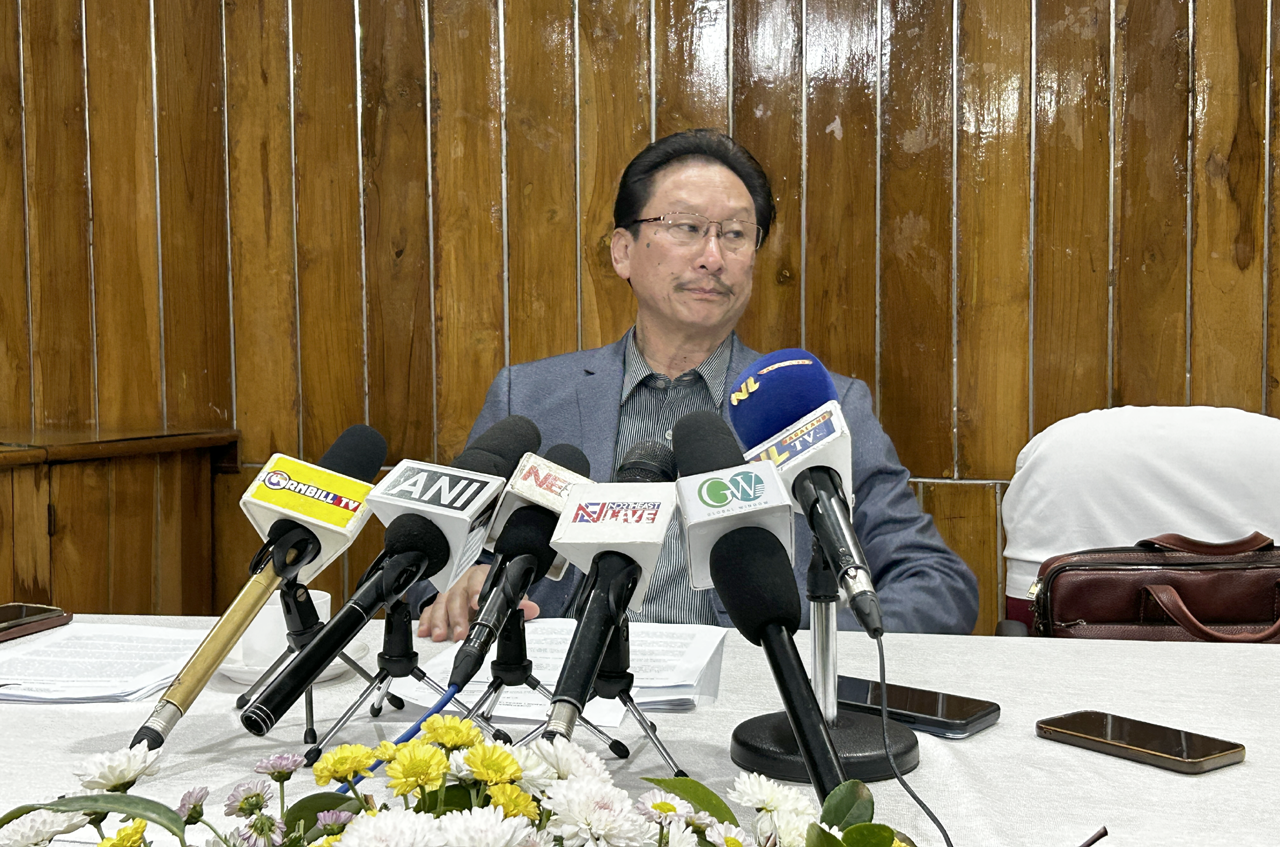The Nagaland Government has appealed to the Joint Coordination Committee (JCC) to end its ongoing pen-down strike, reiterating that the current IAS cadre selection process adheres to long-standing conventions and does not constitute a new policy initiative.
Speaking to the media at Hotel Japfü, Kohima, Government Spokesperson and Minister for Power & Parliamentary Affairs, KG Kenye, said the State Cabinet had deliberated extensively on the issue and expressed concern that the prolonged agitation had nearly brought administrative work to a standstill.
Kenye explained that the dispute emerged following an advertisement issued on March 10, 2025, which restricted applications for an IAS cadre post solely to State Civil Service (SCS) officers. The government, he said, later found that the advertisement — based on a 2020 order of the then Chief Secretary — had been issued without the approval of the competent political authority.
According to him, the 2020 order had deviated from an established convention that allowed both SCS and non-SCS officers of proven merit to be considered for IAS cadre selection. The Cabinet, upon review, determined that the earlier order lacked the authority to override a long-practiced administrative arrangement.
Following the Cabinet’s direction, the advertisement was withdrawn and replaced with a new one on April 24, 2025, restoring the conventional eligibility framework in accordance with the Department of Personnel and Training (DoPT) and the 1997 IAS Appointment and Promotion Regulations. Kenye said the State Screening Committee has since shortlisted five candidates from among 11 applicants, whose names have been forwarded to the Union Public Service Commission (UPSC) for consideration.
“The government has not embarked on any new experiment,” Kenye said. “We have only continued the same practice followed by successive governments for decades.”
He acknowledged that the JCC had written to the UPSC and the DoPT requesting a review, but urged the agitating employees to allow due process to take its course. “Until the Centre responds, it is only fair to call off the strike so that public services are not held hostage,” he appealed.
The Minister further noted that the government has often shown flexibility in responding to public sentiment, but cautioned that agitations cannot become routine responses to every administrative decision.
“Governments are elected by the people to function for a fixed term. It is not possible to govern effectively if every decision is met with protest,” he observed.
Kenye said there was always room for dialogue and review, but warned that continued disruption of the state’s functioning would only deepen public hardship. “Let us be sensible. There is space for both sides to discuss the pros and cons without immobilizing the government,” he said.
Download Nagaland Tribune app on Google Play

On the issue of “backdoor appointees,” as being included in the IAS induction list, Kenye argued that such labels were often misleading. “An appointment is an appointment,” he maintained, adding that many officers who did not enter service through the Public Service Commission have since been regularized and have served with equal competence and integrity. “If such officers have demonstrated merit and responsibility, they too deserve recognition,” he said.
The Minister also cited a recent ruling of the Supreme Court concerning a similar case in Rajasthan, where a petition challenging the inclusion of a non-SCS officer in IAS selection was dismissed.
“The Supreme Court upheld the High Court’s decision and confirmed that the state government had not violated any rules,” he said, emphasizing that the same DoPT guidelines and IAS regulations apply across India.
Kenye remarked that while the government remained committed to peaceful dialogue, it was reaching the limits of endurance. “We are in a catch-22 situation. But if pushed to the wall, you know what will follow — something we want to avoid at all costs,” he said, hinting that continued disruption could invite firm administrative response.
He appealed to the conscience of government employees to act in the public interest. “As civil servants committed to the welfare of the people, they must review their stand. There is nothing that cannot be resolved through understanding and negotiation,” he said.
When asked about speculation of possible sabotage within the system, Kenye said the government preferred to treat the matter as a procedural lapse rather than an intentional act. “I wish to believe it was an unintentional oversight, not something driven by ulterior motives,” he said.
Reiterating the government’s position, Kenye concluded that the state’s actions were consistent with the law and national guidelines. “Let us not paralyze governance,” he urged. “Let us restore normalcy and resolve our issues within the state, through reason and dialogue.”

